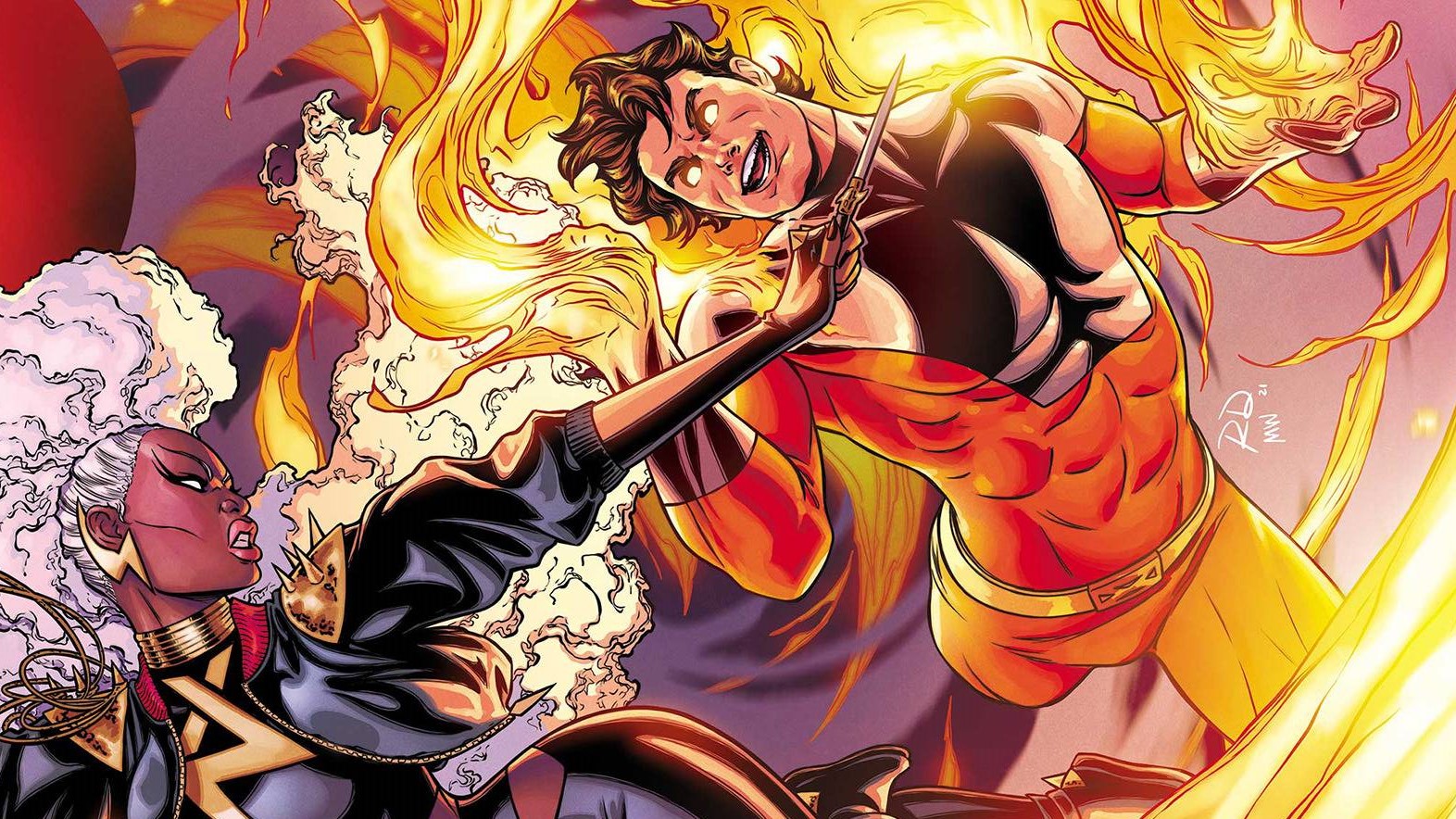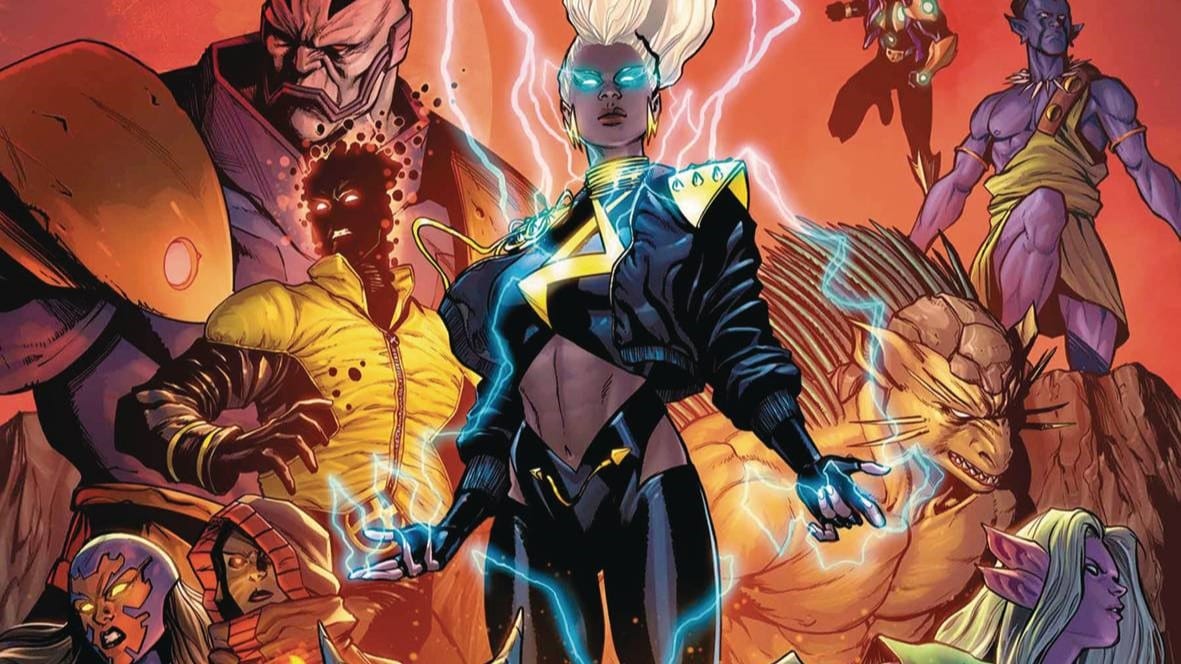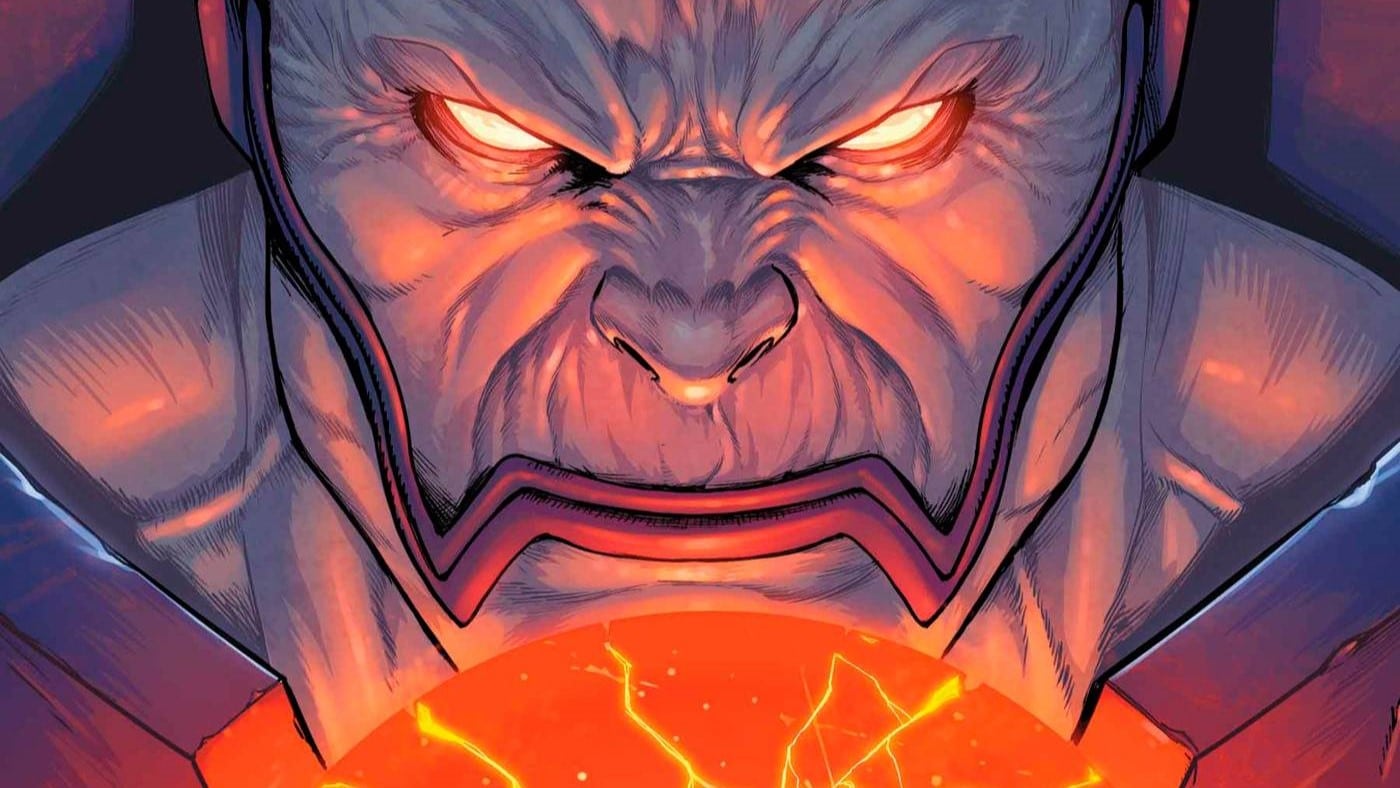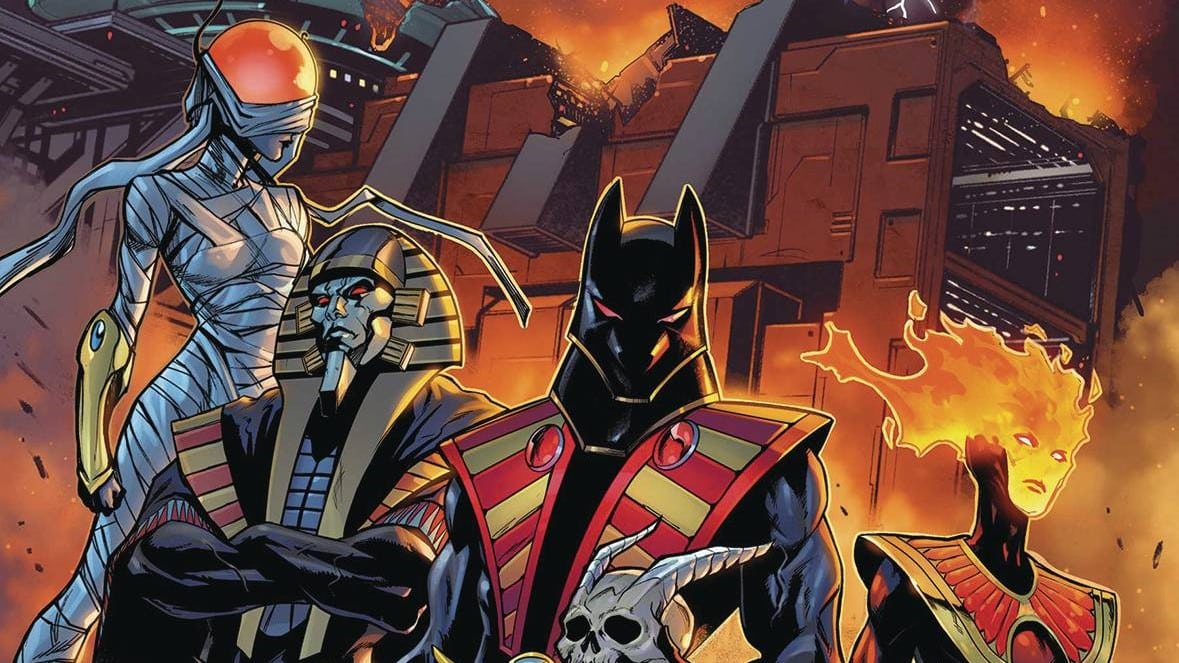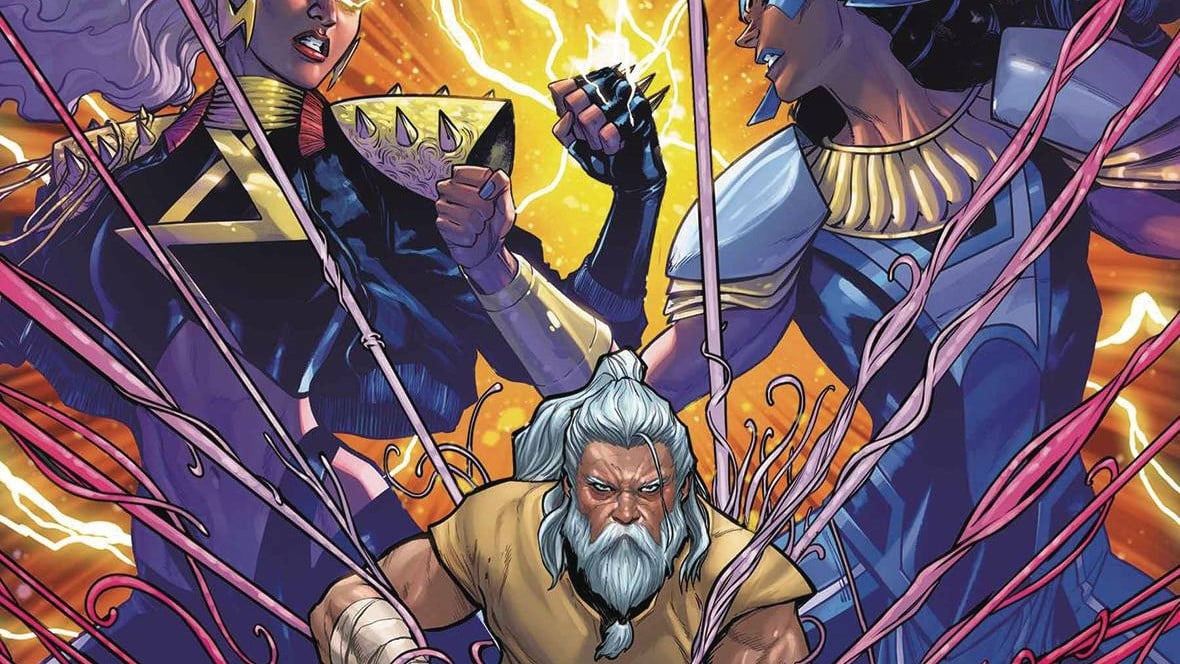The Red planet sits on the intergalatic chess board, used as a pawn with no regard for its inhabitants. A union, a Brotherhood, in needed to assist it. Al Ewing, Stefano Caselli, Federico Blee and Cory Petit bring the thunder in X-Men Red #2
Jude: Joy has been in short supply. The specter of judicial rulings, with repercussions that will reverberate (and harm); the continued rise of capitalist authoritarianism under the guise of “free speech”; and that most American of pastimes, violence against Black people.
Black people who, because our community is so small, were mentors and supporters of one of my closest friends.
There is no comfort in comforting someone experiencing such radical loss. No peace, not even in quiet moments, for the memories, sadness, and anger reverberate between your ears.
There has been little joy for me over the past few weeks.
Until I read X-Men Red.
We ask comics to be many things; immersive, inclusive, well-drawn and well-thought.
But ultimately, we should judge comics by their original purpose: to serve as a joyous escape.
And oh what a joy this is.
There is immersion and inclusion, fantastic art and thoughtful, poignant moments, all in service of joy to the reader. This issue is a delight to behold, and I’m excited and happy, at a time when happy is too rare, to share my joy with you.
Vishal, how are you feeling about this?
Vishal: My relationship with comics (and most escapist media) has always fluctuated, going through spells of complete disinterest followed by stretches where I can’t see myself doing anything else. But if there’s one thing that I’m always interested in, that I’m always looking for, it’s to be able to feel something. To have emotions evoked, be they positive or negative, over things that ultimately do not matter. And X-Men Red, as you say, Jude, is a joy.
When I’m reading this comic (or Vita Ayala and Rod Reis’s New Mutants, or Kieron Gillen and Lukas Werneck’s Immortal X-Men, both of which also were fantastic this week), I find that the emotions I feel over these characters, that have been programmed into me over the course of reading over 50 years’ worth of X-Men comics, are striking me as if I were years younger.
X-Men Red was a title I was extremely wary of reusing, since I have such a negative reaction to the original series and its casual objectification of a culture the writer was very clearly underequipped to write about. But in just two issues, this series has already become one of my favorite X-Books. I’m really looking forward to talking about it.
Is It Happening Now

Jude: Vulcan has a hella convoluted history (because comics), a history that is necessary to really understand the character. The first page does an admirable, if maybe a little too light-handed job of filling the reader in, so let me try in a few sentences:
Vulcan, after a battle with Black Bolt for control of the Shi’ar empire, is pulled from an almost death by extra-dimensional beings who tinker with his power, soul, and psyche, placing darkness around all of his light (i.e. inherent goodness).
Vulcan is now increasingly unstable, creating apperarions of his dead friends Petra and Sway, who haven’t been resurrected and are physical figments of Vulcan’s imagination. Vulcan is flying off the handle quickly and consistently, all while reliving the trauma of being experimented on. In his quiet moments he repeats refrain from his time being experimented on (“is it happening now” – prayers to all involved when the answer is “yes”).
I’m far from a therapist or psychologist, but I know a little something about mental illness, and Xavier’s solution – letting his hurt fester unabated – is absolutely the worst thing you can do. Encouraging his ill behavior, with no guardrails, then feign exasperation that nothing’s improved?
Vulcan isn’t the only sick one.
It’s also worth noting that no one is really listening to Vulcan; no one is asking what he means when he says things, or asking him how he’s feeling or what he needs. He’s being at best placated, and at worst used as a weapon.
By the interdimensional aliens for whatever nefarious purpose they have.
By Xavier who Omega-level mutants are a resource, rare commodities like gold, adamantium, vibranium or mysterium.
Resources are many things; people aren’t one of them.
And by Brand, who, as always, has plans.
Vishal: I think it’s extremely telling that Scott is present when Xavier tries to explain to Vulcan that his friends are dead but doesn’t say a word the moment the difficult conversation actually starts. Scott is not trying to use his brother, he’s not! But he’s not able to truly help Gabe. Vulcan is surrounded on all sides by people either trying to coddle him or manipulate him, and for someone who’s been through as much trauma as he has it’s never going to turn out well. He’s still a petulant child through and through, because he was never able to truly grow past that.
Jude: And about Brand’s intricate plans: blessedly without a multi-issue tease, we see her iteration of the X-Men – essentially the SWORD team, plus Random and minus Wiz Kid (who’s still on SWORD’s first station).
And minus Manifold, who, in a beautifully blessed exchange, calls Brand out on her imperialist mindset and her clear murder of Gyrich (a murder everyone seems ok with – understandable!) and exits the station (and, presumably, the series).
Let’s pause here. Brand and Beast, the former (and future?) lovers, have a lot in common.
Really smart. Really sneaky.
And really not as smart or sneaky as they think they are.
In X-Force we see Beast’s arrogance repeatedly get the best of him. In SWORD, the implication has always been that Brand has been a step ahead; but, we have to note, this implication always came from Brand’s point of view. No one likes her. No one trusts her. Her secrets, as this exchange shows, aren’t really that secret. Even her defecton to Orchis, I’m willing to bet, isn’t as secret as she thinks it is.
And while (spoiler) more of her plans are laid to waste later in this issue, let the record show that she always views her failures as just another step to an eventual success. And maybe she’s right!
Hopefully she’s not.
Vishal: I will say, as the resident adorer of Nathan Christopher Charles Dayspring Askani’son Summers, I remain a little hesitant on Ewing’s writing of Cable. I’m not saying that Cable’s got to join the brotherhood – he’s his father’s son, he’d always prefer a more structured military-esque unit to what could at best be described as a coalition of currently like-minded individuals. But he joins up with Brand’s “X-Men Red” without any objection, without even a hint that he’s aware that something is off or that he has any more distrust for Brand than normal.
I came out of the first issue expecting that Cable, Brand, and the Brotherhood would be the three main factions on Mars, but at least for now it seems that Cable is more a stooge than general. And that doesn’t fit to me. Cable’s a leader, he always has been. I hope we get to see more of that as the series goes on.
You Have Your Work Cut Out

Jude: Our newly formed X-Men arrive on Mars to an event already in progress. A group of Progenitors – “worldmind (!) level civilization of unethical space scientists with computer brains” who build artificial solar systems (!) – have randomly shown up to fight the (likely) weakest group of Arakki on the planet.
How convenient.
Brand, again, treats the Arakki like inferiors and, again another mutant of color (Frenzy) intercedes, advocating for the autonomy of the people they’re trying to “save”. I’m 100% sure Ewing is doing this on purpose.
And I love it.
Arakki could easily be seen as a reservation, land granted by a “benevolent” “master” nation, to help the poor natives who can’t assimilate. That’s the colonizer view. That’s the Brand view. That this view is acknowledged and challenged is what makes this work so beautiful. X-men Red, at its core, is about kings and colonies; about the right to rule and the rights of those “ruled”. And while the best version of this story would be told from the Arakki point of view, I still appreciate the conversation and the execution.
Vishal: I’ve been in a community where X-Men discussion has essentially been quarantined to a specific space because there’s a group of people who essentially all unironically spout the same points Brand makes on a regular basis. I do not engage in that space because, as you said, it’s a colonizer view. It’s a mindset of looking at Krakoa (and Arakko!) based on a culture that thrived on colonizing and stealing from everywhere else.
So when Ewing makes a point to bring these ideas up and then immediately juxtapose them with a different cultural view, a perspective that more closely mirrors my own, it’s hard to put into words why it feels so meaningful. There’s a cynical view of all of this that a lot of people are well within their rights to take, but to me it feels more like a lack of imagination. Like they can’t imagine a world where a dominant culture doesn’t try to impose its will on the rest of the world. Like they can’t imagine that sometimes when a group finally gains power they won’t try to exact revenge on those who wronged them.
If humanity gave mutantkind even a fraction of the consideration and respect they DEMAND from mutants, there would be minimal conflict, if any. Of course, that also means there wouldn’t be a story, and I much prefer the version where there is a story, but if readers are going to play with thought experiments like “what if the mutants are colonizers” it is incredibly refreshing to see the writers point it out as a narrow-minded perspective.
Our Brotherhood

Jude: First, let’s just address the elephant in the room. Referring to The Fisher King as “unarmed king” “ who ruled at midnight” has *got* to be a reference to the night section of their council, right?
Or is that just too on the nose obvious?
Vishal: Agreed, the Fisher King is absolutely more powerful within Arakko’s society than he lets on, and I enjoy seeing Magneto constantly be surprised by just how much this seemingly unimportant man truly matters.
Jude: In any case, that The Brotherhood engages the people, ask for their permission to help, asks for their assistance in the matter, and then joins in the spoils of victory as equals, not as a poverty project to be pitied is, well, something a lot of governments, NGOs and non-profits could learn from.
But I digress.
Anyway, let’s just marvel at my favorite page of the year. Storm choking the power out of Vulcan. My god yes. Yes Yes yes yes yes. This is beautiful. This is art. This is just *right*.
Caselli’s done a great job throughout, especially with intricate detail in faces. Emotions are prominent throughout this work, and Caselli does a wonderful job of telegraphing emotion in ways that give Ewing’s words more weight.
And here? In this series of panels? All of that emotion and detail is on display, times 10 [Ed. note: Please admire our restraint because we could have stylized that as “x X”]. Storm’s determination; Vulcan’s shock followed by struggle. Everything about this is wonderfully made. Storm feels powerful, resolute, I control.
Look at how she’s using her power. Not just lightning and wind, but an ice entombment that rivals what Bobby would do; a recognition that, at the core, her power is manipulating energy, negating the vampiric nature of Gabriel’s gifts.
Look as she deliberately, surgically, understands the nuances and limits of her opponent and overpowers him with will and skill.
Look how she doesn’t have to be neutered to be powerful.
Look how she doesn’t need to use knives.
Yes. Yes again.
The comment that Brand makes in her (oh so narcissistic) recap – that she expected storm to be the Queen of Wakanda – presumably distant, obtuse, overbearing like someone we know and love. But instead they got the Queen of the Morlocks – a woman of the people, for the people X who works with the people.
Brand’s arrogance could not convince someone actually wanting to work with the Arakki. And this, in yet another last page reveal, we see she’s decided to use her omega to take out someone on the ring.
Tarn, the mutant who’s expert at controlling powers and emotions, against the most emotional mutant in existence.
I’m sure this will go well.
Vishal: Vulcan’s been written as a petulant child since his creation in Deadly Genesis, and I really enjoy that while we’re agreeing that he deserves some death, he’s still got to act like a child. “Tarn the dead” is the silliest ending to this issue Ewing could write, and it lands so well as essentially a thesis statement on who this character is. I can’t wait to see where this goes.
X-Traneous Thoughts

- It’s sick and sad that in a nation this bountiful GoFundMe is the default way people get help. And yet, here we are. If you’re able, donate to one of these verified orgs and support the people – and community – affected by this unnecessary racist trauma.
- Magneto eviscerating the robot with a snap of his finger? Excellent.
- Manifold getting his melanin back in his final appearance? Excellent.
- I’m referring to her as Mother of Mars from now on. Effing excellent.
- All writers have favorite villains they keep bringing back for throwaway fight scenes and I love that Ewing uses giant space gods for that purpose.
- How powerful is Vulcan that one of his apparitions could apparently teach a class?

